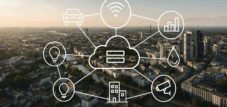
A milestone for municipal digitization - this 'operating system' now makes German municipalities more efficient! - Image: Xpert.digital
No surveillance, just efficiency: save millions, reduce CO2 - the innovative system that already inspires 25 cities
Smart cities during the start: 25 cities in record time - the operating system that changes Germany
The Cologne Startup Datmatters records remarkable success with its new type of operating system for smart cities. Within a few weeks after the official performance, 25 German cities have already implemented the technology that optimized urban infrastructures through innovative sensors and AI-supported analysis. The rapid distribution of the system indicates a fundamental change in municipal administration, in which data -based decision -making becomes the new standard.
Suitable for:
- Smart City and Urbanos of Datamatters: Germany's first municipal operating system reaches 25 connected cities
The development of Datamatters: From the university spin-off to a smart city pioneer
The story of Datamatters begins at RWTH Aachen, where Dr. Daniel Trauth founded the company and later moved to Cologne. Originally launched in 2018 under the name Senseering GmbH and renamed Datamatters in 2024, the company specializes in the practical application of artificial intelligence in real economy. The founder travels a deliberately down -to -earth approach: "We work in the real economy and are a real company that grows with satisfied customers without venture capital instead of being rich in the speculation poker," explains Dr. Truth.
Unlike many AI startups that concentrate on generative AI for text, image and video generation, Datamatters relies on connecting AI with real infrastructure-from smart cities to smart factories to smart buildings. This orientation introduced the company numerous awards, including the RWTH Spin-Off Award 2019. In the meantime, Dr. Trauth as a co-chairman of the “Real-World Ai Forum” in the global think tank Diplomatic Council even the United Nations on Smart City concepts.
Urbanos: The digital operating system for modern cities
At the beginning of May 2025, Datmatters with Urbanos presented the world's first dedicated operating system for smart cities worldwide. Similar to a computer or smartphone operating system, Urbanos organizes digital processes, but is specially designed for the “smartization” of urban infrastructures- from traffic routing to waste management and energy supply to public security.
Technical architecture and functionality
The system is based on a multi-layer model with five interlocking levels:
- Sensors: A network of sensors records real -time data for various urban aspects
- Connectivity: The data collected is transmitted to a municipal data space
- AI analysis: The data is evaluated by artificial intelligence and forecasts are created
- Visualization: The so -called Urbancockpit represents analyzes and forecasts for decision -makers
- Automation: Optimized services for citizenship and administration are implemented
A special feature is the integrated Appstore, through which municipal care companies and private sector companies can offer their services. This modular structure makes Urbanos highly scalable and suitable for cities of all sizes - from small municipalities to center cities to millions.
Areas of application and examples of success
The system offers a wide range of possible uses, whereby the municipal committees can freely decide in which areas they want to start. The most popular applications include:
Intelligent waste management
A prime example of practical use is smart garbage cans, which are equipped with level sensors. These transmit data to a central point where the logistics of waste disposal is optimized. As a result, the costs of around 20 percent and the CO2 footprint were reduced by around 30 percent in pilot projects. For this application, the company even had an animated explanatory film developed in PixelArt style that clearly shows the complex technology.
Optimized public transport
By cameras in buses and trains can be precisely recorded how many seats and standing rooms are on which lines at what times. Based on this, the AI can develop recommendations to optimize public transport and also take into account events such as city festivals, football games or cultural events. "The citizens are experiencing that buses and trains drive to the right frequency, and the urban operator benefits from the more precise personnel deployment and cost optimization," explains Dr. Truth.
Other areas of application
The spectrum ranges from parking space management to monitoring environmental parameters such as air quality, fine dust and CO2 to early warning systems for anomalies such as extreme weather or pipe breaks. In Dormagen, for example, sensors on street lamps capture pollution and pedestrian traffic, which supports urban planning and environmental protection.
The Urbanos pilot program: easy entry for municipalities
A special advantage of the system lies in its inexpensive implementation model. Municipalities only have to install the sensors on site and have it put into operation. The data space, the AI logic and the urbancockpit can be made available by data matters, which means that the necessary initial investments are kept low.
As part of a nine -month pilot program, interested municipalities receive 50 ready -to -use sensors, access to the data space and the artificial intelligence of urbanos as well as an urban -adapted urbancockpit with dashboards for different areas of application. "Most inquiries are surprised at how straightforward and inexpensive a test project can be started," reports Dr. Truth.
Current implementations
Since the beginning of June 2025, 25 cities in Germany have been connected to the “digital community center” via sensors. Named Aachen, Auweiler, Bad Honnef, Coesfeld, Dormagen, Dülmen, Essen, Euskirchen, Frechen, Grevenbroich, Heiligenstedt, Hürth, Krefeld, Leverkusen, Lüdinghausen, Mönchen-Gladbach, Munich, Nürnberg, Siegen, Singen, Solingen, St. Augustin, Widdersdorf and Willich. According to international reports, the system is already piloted in cities in Belgium, France and the Netherlands.
Suitable for:
- Why authorities, municipalities and municipalities find it difficult: Administrative modernization and optimization for cities and rural areas | Kaizen
Data protection and security in the urban context
Data protection plays a central role in a time of increasing digitization. "Municipalities want a smart city - but not a surveillance city," emphasizes Dr. Truth. The company therefore attaches great importance to compliance with strict data protection and security standards. Personal data is not recorded and the entire company takes place exclusively in data centers based in Germany.
Future perspectives and global importance
Rapid urbanization poses major challenges worldwide. According to the United Nations estimates, around 60 percent of the world's population will live in metropolitan areas in 2030. The problems associated with the associated infrastructures and artificial intelligence will only be mastered.
With the global smart city market, which is expected to achieve a volume of $ 4 trillion by 2030, Datamatters strategically positions itself in a promising sector. In particular, the markets for smart buildings ($ 100 billion), smart factories ($ 300 billion) and smart cities ($ 600 billion) offer enormous growth potential.
The digital transformation of urban space
The Urbanos system from Datmatters marks significant progress in the digital transformation of cities. By combining sensors, data analysis and artificial intelligence, municipal processes are made more efficient, more sustainable and more citizen -friendly.
"Many decision-makers only make it clear in the test operation what enormous advantages it offers if they not only get the current state, which is impressive enough, but also AI-based forecasts, which will happen in the city in the next few weeks and months," explains Dr. Truth. This transparency and foresight enables municipalities to proactively act instead of reactive and to optimally use their resources.
With the constant expansion of the connected cities and the continuous further development of technology, Urbanos could make a significant contribution to coping with urban challenges and set the standard for future smart city solutions.
Suitable for:
Your global marketing and business development partner
☑️ Our business language is English or German
☑️ NEW: Correspondence in your national language!
I would be happy to serve you and my team as a personal advisor.
You can contact me by filling out the contact form or simply call me on +49 89 89 674 804 (Munich) . My email address is: wolfenstein ∂ xpert.digital
I'm looking forward to our joint project.

